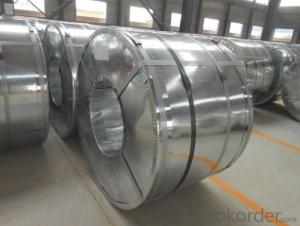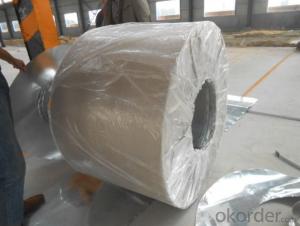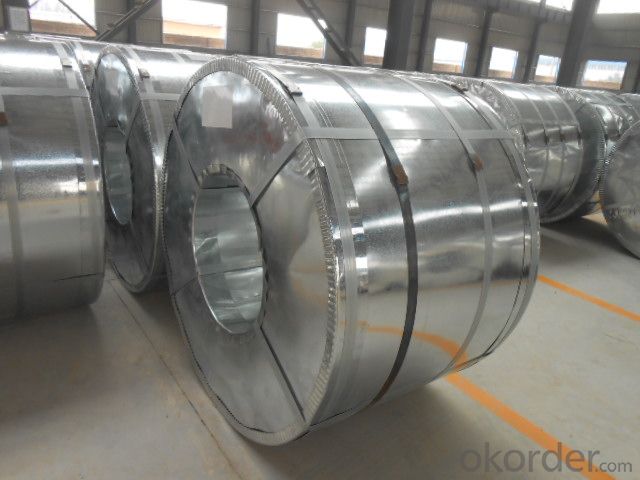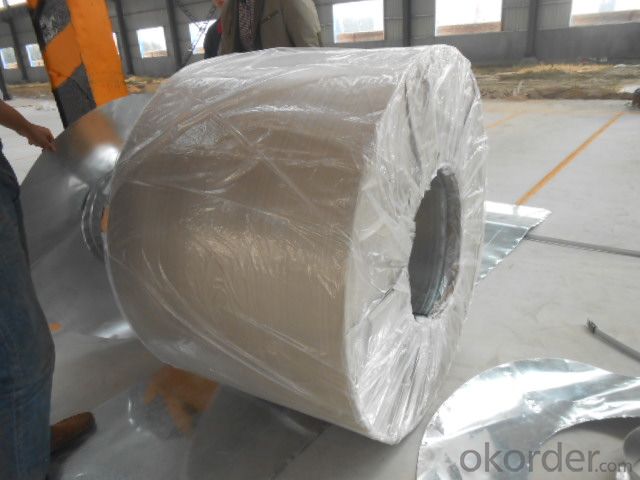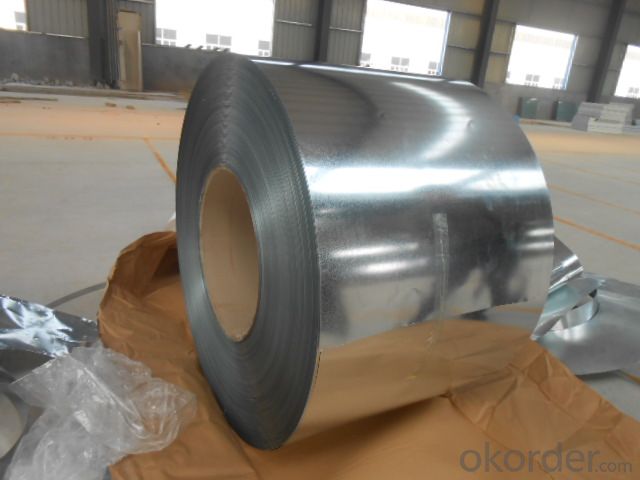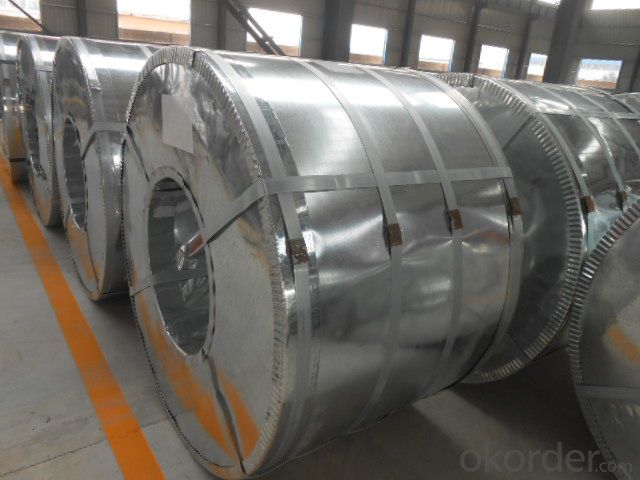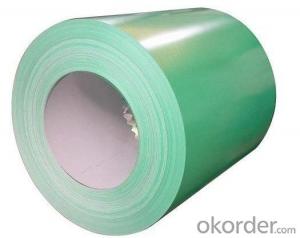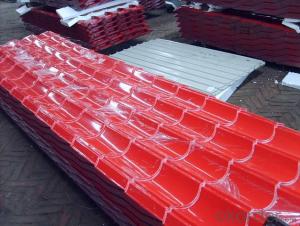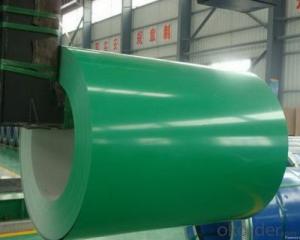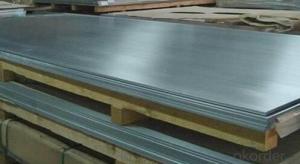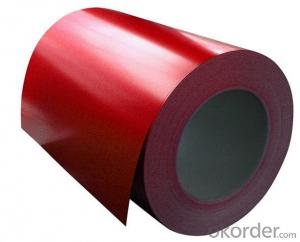Prime Galvanized steel coil zinc coating 120g/m2
- Loading Port:
- Tianjin
- Payment Terms:
- TT OR LC
- Min Order Qty:
- 100 m.t.
- Supply Capability:
- 10000 m.t./month
OKorder Service Pledge
OKorder Financial Service
You Might Also Like
Prime Galvanized steel coil
Packaging & Delivery
Packaging Detail: seaworthy export package
Delivery Detail: on request
Specifications
1. more than 10 years’ experience on this field
2. advanced equipments
3. competitive price
4. soonest delivery
Product Description :
Commodity
Hot dip galvanized steel coil
Technical Standard: JIS 3302 / ASTM A653 / EN10143/ GB/T 2518
Grade:DX51D/ S250,280,320GD,SGCC,SGHC,SGH340,SGH400,SGH440,G450,G550
Types:Commercial / Drawing / Deep Drawing / Structural quality
Width: 900mm/1000mm/1219mm/1200mm/1220mm/1250mm
Thickness: 0.2mm~4.0mm
Type of coating: galvanized
Zinc coating: Z40-275g/m2,Z40-Z450g/m2
Surface treatment: zero spangle / regular spangle/ big spangle
ID coil: 508mm or 610mm
Coil weight: 3-10/MT per coil
Package: Properly packed for ocean freight exportation in 20''container
Application:: home appliances, constructions, building, machineries
Our Advantages :
1. Expertise:
More than 10 years of manufacture: we know how to properly handle every step of production.
2. Competitive price:
We can offer competitive prices to our customers.
3. Accuracy:
We have excellent technicians and leaders, which can ensure our products are exactly what you want.
4. Materials:
All galvanized steel coils are made of high-quality raw materials.
5. Certificate:
Our products are certified by ISO9001.
6. Productivity:
We have large-scales of production lines,, which can guarantee all your orders will be finished in earliest time.
Hr CGL Technical Process:
Coil loading-> uncoiling-> cutting-> welding-> entry accumulator-> Heating and deoxidization-> galvanizing-> air cooling->water quenching-> air dryer-> tension leveler-> Passivation->air dryer->exit accumulator-> oiling-> cutting-> recoiling->coil unloading-> packing
The furnace heating style: improved Sendzimir heating technology
Hourly output: max.76.3t/h
Process after coating: tension leveling, Passivation or oiling
Our Service
Our quality
Test Equipments of Prepainted Galvanized Steel Coil : Salt-spray tester; Atomic absorption spectrophotometer; Rockwell typer hardness tester; Tensile test machine; Metrohm titration; Laboratory Bend test machine.
Our packing
Properly packed for ocean freight exportation in 20''container, galvanized metal fluted rings on inner and outer edges, galvanized metal & waterproof paper wall protection disk, galvanized metal & waterproof paper around circumference.
R&D department
R&D department concentrates on researching and developing reliable products with best quality. The quality department test and control every process of production to guarantee the best quality of product
- Q: in a lab at school we did heat treatment of steelwhat are the possible phases present in the steel sample in as-received, as-quenched and as-tempered conditions? specifically when is it ferrite, austenite and pearliteis the steel originally in the ferrite phase? then when headed turns into austenite and when quenched martensite is formed and when tempered cermentite is formed...........where is pearlite involved and am i correct about the ferrite?
- hey from what i learned in uni last sem, steel is originally ferrite form at first at room conditions. it will undergo poly morphic transformation to become FCC structure austenite form at 912 degree celcius. under conditions, it can become pearlite (which is a combination of ferrite and cementite) or bainitie( a finer form of pearlite). queching conditions to room temperature will form martensite which is the strongest but brittle steel form. tempered cementite is formed when we quench it and then raise temperatures before sir cooling. hope it helps, pls vote me best answer is i deserve it. thanks
- Q: How are steel coils processed at the steel service centers?
- Steel service centers process steel coils through a series of steps to transform them into finished products that meet the specific requirements of customers. The process typically begins when the steel coils arrive at the service center. These coils are usually large and heavy, and they may have been produced by a steel mill or imported from overseas. Upon arrival, the steel coils undergo a quality inspection to identify any defects and ensure that only high-quality coils are used in the production process. After inspection, the coils are stored in a warehouse until they are ready for processing. Next, the steel coils are uncoiled to create flat sheets of steel. This can be done manually or using automated machines, depending on the size and thickness of the coils. The uncoiled steel is then leveled to remove any residual stress and ensure a flat and consistent surface. Once leveled, the steel sheets go through various processes based on the desired end product. These processes may include cutting, shearing, slitting, and forming. Cutting and shearing involve shaping the steel sheets into specific sizes or shapes. Slitting involves cutting the steel into narrow strips, while forming involves bending or shaping the steel. After the desired processing operations are completed, the steel sheets are often treated with surface finishes to enhance their appearance or protect them from corrosion. These finishes may include painting, coating, or galvanizing. Finally, the processed steel sheets undergo another quality inspection to ensure they meet the required specifications. They are then packaged and prepared for shipment to customers in industries such as construction, automotive, or manufacturing. Overall, the processing of steel coils at steel service centers involves a combination of inspection, uncoiling, leveling, cutting/shearing/slitting/forming, surface finishing, quality control, and packaging. This process allows for the transformation of steel coils into finished products that are customized to meet the specific needs and requirements of customers.
- Q: How many pounds can steel lift?
- Well, metal steel can lift an infinite amount of weight if necessary, BUT it can only withstand tensile PRESSURE up to a certain amount. That amount depends on what kind of steel you have; you can have low and high carbon steel, for example, here are some maximum tensile forces a lot of common steels can withstand: Coated Steel (Galvanized): 200-215 GPa Terne Coated Stainless Steel: 189 - 197 GPa Terne Coated Steel: 185-200 GPa AirMet100 High alloy steel: 193-203 GPa AF1410: 203 -213 GPa 17% Cobalt Steel: 199-209 GPa 36% Cobalt Steel: 199-209 GPa 6% Tungsten Steel: 218-229 GPa A-286: 201-211 GPa N-115: 201-211 GPa 250 Maraging Steel: 183 - 192 GPa 280 (300) Maraging Steel: 183-192 GPa And that's just Coated and High-alloy steels, I have yet to go through Cast Irons, Commercial-purity Iron, Low alloy steel, low carbon steel, medium alloy steel, medium carbon steel, stainless steels, tool steels, and very low carbon steels, and I'm not even sure if this is a complete list of the different types of steels in the world. TL;DR We need more information. EDIT: By pressure, I mean the negative tensile type of pressure. EDIT 2: At it's thinnest point, most supportive skeletal features will be able to support 132 pounds quite easily. However, if you want to make an effective light-weight strong skeleton, I would suggest using aluminium rather than steel.
- Q: My remington has a 28 inch barrel and was wondering if it would damage my shotgun to shoot steel out of it?
- I shoot steel out of my 870 express all the time.
- Q: How are steel coils used in the production of railway tracks?
- Railway tracks rely heavily on steel coils, which are indispensable in their production. These coils, typically made from top-notch steel, are utilized to create the rails that constitute the bedrock of the tracks. The process commences with the unwinding of the steel coils, which are then fed into a sequence of machines that mold and fashion them into the desired rail profile. Initially, the steel coils are passed through a rolling mill, where they undergo gradual flattening and shaping, thereby transforming into elongated steel strips. This technique, known as hot rolling, involves heating the steel to high temperatures to enhance its pliability. The rolling mill exerts substantial pressure on the steel, progressively molding it into the desired rail shape. Once the steel coils have been rolled into the requisite form, they are subsequently severed into individual rail lengths. The length of these rails may vary depending on the specifications of the railway track being produced. The rail lengths then undergo further processing to eliminate any flaws and straighten them out. Following this initial shaping and processing, the rails undergo a series of supplementary treatments. These treatments may entail heat treatment to bolster their strength and durability, as well as various surface treatments to prevent corrosion and wear. Once the rails have undergone all the necessary treatments, they are ready for installation on the railway track. They are laid out meticulously in a predetermined pattern, with each rail securely fastened to the sleepers or ties. The continuous length of steel provided by the coils ensures a seamless and uniform track, enabling trains to travel smoothly and safely. In conclusion, steel coils are crucial components in the production of railway tracks. They are utilized to manufacture the rails that serve as the foundation of the tracks, guaranteeing durability, strength, and a smooth surface for trains to traverse. The use of high-quality steel coils in this process is essential to ensure the safety and efficiency of railway transportation.
- Q: Can steel coils be used in the food processing industry?
- No, steel coils are not typically used in the food processing industry due to the risk of contamination and potential health hazards. Food-grade materials such as stainless steel are preferred for their hygienic properties and ability to withstand high sanitary standards.
- Q: How are steel coils inspected for defects after recoiling?
- Steel coils are inspected for defects after recoiling through a thorough visual examination and non-destructive testing techniques such as ultrasonic or magnetic particle inspections. These methods identify any surface imperfections, cracks, or abnormalities in the steel coils to ensure their quality and integrity.
- Q: Can steel coils be custom-made to specific requirements?
- Yes, steel coils can be custom-made to specific requirements.
- Q: Hi, I have ranch style home. I would like to remove a barring wall, And leave it open it will become a 18' foot 7 inch opening , and I'm interested in installing a steel beam so that i may remove the barring wall that supporting the ceiling and rafters. My house is about 57' feet long 28' feet 7 inch wide and it is 13' feet high from the floor to the top of the roof ridge. I heard there is aluminum beams but I never heard of that, I've only heard of steel beams. I don't want to use wood. I would also like to now how much longer do i need the beam to be the opening would be 18'7 plus the extra that i would need to put on the block wall to hold the beam up, do I make it 2' feet bigger so i can have a foot on each side that would sit on a block wall. or do i need more then that.THanks for your help
- I see steel beams inserted into pockets in concrete foundations, they typically go 6 inches into the pocket. There is other problems with what you want to do. You must support the rafters while the work is being done. You must be sure your beam pockets are strong enough for the weight. another problem is that a steel beam this size is very heavy, How will you place it without a crane? Maybe an army of helpers can lift it. You may want to consider a laminated wood beam, they are lighter than steel.
- Q: How are steel coils inspected for surface finish using profilometry?
- Steel coils are inspected for surface finish using profilometry by measuring the surface topography using a profilometer. The profilometer scans the surface of the steel coil and records the deviations from the ideal surface. This data is then used to determine the roughness, waviness, and other surface parameters of the steel coil, providing a quantitative assessment of its surface finish quality.
Send your message to us
Prime Galvanized steel coil zinc coating 120g/m2
- Loading Port:
- Tianjin
- Payment Terms:
- TT OR LC
- Min Order Qty:
- 100 m.t.
- Supply Capability:
- 10000 m.t./month
OKorder Service Pledge
OKorder Financial Service
Similar products
Hot products
Hot Searches
Related keywords
